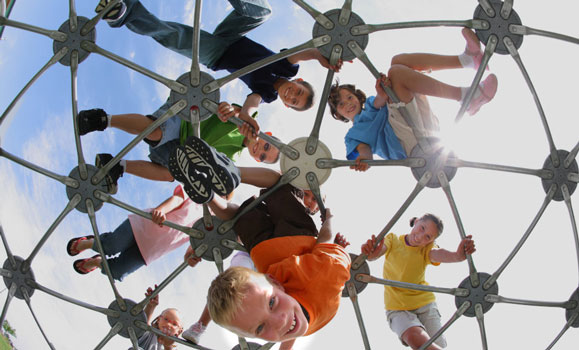News
» Go to news mainDal Health contributes to Canada's first "State of the Nation" report on children's physical literacy

The results from a large national research project led by the Healthy Active Living and Obesity Research Group (HALO) at the CHEO Research Institute shows that about two-thirds of Canadian children haven’t achieved an acceptable level of physical literacy. Physical literacy is more than just fitness or motor skill; it includes the motivation, confidence, physical competence, knowledge and understanding to value and take responsibility for engagement in physical activities for life.
Fourteen articles that looked at different aspects of physical literacy and the Canadian Assessment of Physical Literacy (CAPL) were published today as a special supplement in BMC Public Health. More than 10,000 children aged eight to 12, from 11 cities across the country participated in the study through the CHEO Research Institute and research partners. Using the CAPL, children were assessed on a number of different areas.
Dalhousie University was one of the study sites, with Faculty of Health researchers collecting data on more than 900 children for the project. From Dalhousie’s School of Health and Human Performance, Dr. Michelle Stone was principal investigator, Dr. Sherry Huybers was project coordinator and Drs. Laurene Rehman and Melanie Keats were project collaborators.
“Dalhousie is incredibly proud to be a part of this ground-breaking study,” says Dr. Alice Aiken, Vice President Research and Innovation at Dalhousie University. “The work being done by Dr. Stone, Dr. Huybers, Dr. Rehman and Dr. Keats is having a substantial impact on the way we look at children’s physical literacy in our city, our province and in our country.”
The results demonstrate that more needs to be done to ensure Canadian children are physically literate. “We hear about increasing obesity rates in kids, falling rates of physical activity and more time spent in front of screens,” says Dr. Mark Tremblay, Senior Scientist at the CHEO Research Institute and Director for HALO. “Physical literacy looks at different domains in children to give a better overall picture of children’s healthy active living and future health. Physically literate children become more active and healthy children, which sets them up for life.”
The HALO Research Group has been developing and refining the CAPL for the past 10 years. It’s a robust tool that is valid, reliable and feasible and is being used across the country and internationally. The results of this research provide the first comprehensive assessment of the physical literacy of Canadian children.
“Through this project, we provide comprehensive evidence that Canadian children aged eight to 12 years are falling short of standards for components of physical literacy,” said Dr. Mark Tremblay. “For example, boys and girls across Canada have aerobic fitness levels at the 30th percentile of global norms and only 20% are meeting physical activity guidelines.”
“These results show us that more needs to be done,” continues Tremblay. “Every organization concerned with the well-being of children, whether provincial governments, municipal public health and recreation departments, boards of education and sports or recreation groups, should allocate increased resources to increase children’s physical literacy. Addition education campaigns, greater priority in school curricula and increased numbers of physical education specialists could have a real impact in the health of Canada’s children.”
Findings from this project have led to further refinements of the Canadian Assessment of Physical Literacy and the release of the second edition of the Canadian Assessment of Physical Literacy, or CAPL-2.
“Ensuring that we have the right tools for coaches, educators and parents is an important way to increase physical literacy in Canada,” says Pat Longmuir, Scientist with the CHEO Research Institute, HALO Research Group. “The CAPL-2 is a shorter, easier to administer series of tests that can be used to assess and monitor physical literacy in Canada. The materials are available in both English and French, free of charge at www.capl.eclp.ca.”
This research study was made possible in part with support from the RBC Learn to Play Project, an initiative funded by RBC and the Public Health Agency of Canada and delivered in partnership with ParticipACTION, with additional support from Mitacs.
Learn More:
Listen to Dr. Michelle Stone, School of Health and Human Performance, talk to CBC Information Morning about the project (7:10)
Recent News
- Bridging continents: Dal students to learn, share and connect in West Africa
- Partnership between UpLift and Public Health sees continued funding allocated for Youth Engagement Coordinators
- Dal Health grad students use podcasting to discover the people behind the science
- Nursing student closer to living out her dream of helping people thanks to support of new award
- Master of Nursing grad passionate about working in mental health and addictions
- MSc Audiology grad shifts career from entomologist to audiologist
- Occupational Science grad exploring concept of care farming
- Dal Crossroads continues 20 year legacy of student ‑led learning
